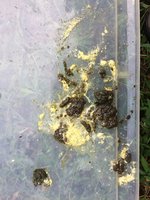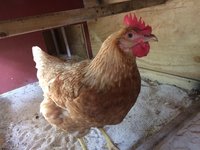- Thread starter
- #19
Wil781
Songster
Update on Ellie Mae: she is hanging with us, she eats a little, she must eat more than I think because she poops, the urates are still yellow but not as bright yellow so maybe that is a good thing. I did contact the diagnostic lab, they only do the necropsy and I have to drive the bird to them which it is only an hour and a half away one way which is no problem but like I told them I would prefer to not lose my pullet to find out what's wrong with her. Anyway I will update again hopefully with great news!I would try the corid and de-wormer. She may have some reproductive problems going on as well.
It is frustrating when they are not doing well, sometimes there is not much we can do but try to treat what we think may be happening, but often times we won't be able to find out much until they have passed and a necrospy is performed.
If you are near your state lab http://agi.alabama.gov/divisions/veterinary-diagnostic-labs
You might want to call them to see if they accept stool samples for testing. Each state is different so I don't know if that's possible.







